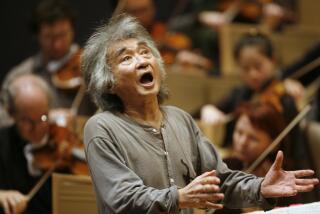Madness for Mozart Spawns Pens, Chocolates, Lingerie : Japan: Although hundreds of concerts are commemorating the 200th anniversary of the composer’s death, the fad has turned beyond music.
- Share via
TOKYO — Wolfgang Amadeus Mozart never visited Japan and probably never heard the soulful tunes plucked on the banjo-like samisen. No matter. This year the nation is just mad for Mozart.
Although hundreds of concerts are commemorating the 200th anniversary of the Austrian composer’s death Dec. 5, 1791, the Japanese crave more than mere music.
In true mercantilist fashion, companies have outdone themselves turning out namesake chocolates, sake and even lingerie for eager fans.
The most intimate tribute to Mozart may be Triumph International Japan’s black brassiere studded with blinking lights. When fastened, it plays “Twinkle, Twinkle Little Star”--a tune the manufacturers theorize was authored by Mozart.
The computer chip-laden bra and matching panties are worth about $145, although the promotional gimmick is not for sale because it can’t be washed, company spokeswoman Tadako Musha said.
Dairy managers and at least two brewers of rice wine claim that playing Mozart’s music helps cows produce good milk and bacteria produce good sake, some of which is named after the composer.
The Sawada Brewery in western Japan pipes Mozart programs through its plant every day. “There’s all kinds of classical music, but Mozart seems to make the best sake, maybe because it’s so gentle,” said brewery worker Hatsue Kodama.
It is a claim that even academics here ponder seriously.
“If you were going to make a sake named after Bach, Mozart, Miles Davis or Saburo Kitajima (a singer), I suppose Mozart would be the best choice,” Hideo Takahashi, a Meiji University professor and an expert on the composer said in an interview in the highbrow monthly magazine Chuo Koron.
“I guess you’d have to drink it to find out,” said writer Takeo Ashizu.
All of this folderol dismays other Mozart specialists such as Bin Ebisawa, president of Kunitachi College of Music in Tokyo.
“Mozart isn’t for eating, drinking or wearing; it’s for listening,” Ebisawa said. “A memorial year should be observed quietly, with some consideration for the sadness of Mozart’s passing.”
Ebisawa and other hard-core Japanese Mozart fans want nothing to do with Mozart pens, chocolates and lingerie. They are solely interested in the man and his music.
Some of that dedication seems to be paying off.
Japanese composer Shigeaki Saigusa has been honored with a request by the International Stiftung Mozarteum, an organization devoted to Mozart research, to write an ending for the “Requiem Mass,” left unfinished at Mozart’s death. The arrangement will be performed Dec. 5 in a memorial concert in Salzburg, Austria.
Among the others caught up in the bicentennial commemorations are the Dai-Ichi Mutual Life Insurance Co., which has donated about $3.7 million to the International Stiftung Mozarteum to help convert into a museum a Salzburg building that once was part of Mozart’s home.
Shogakukan, a major publisher, has released a 15-volume “Complete Mozart Edition” series in cooperation with Phillips of Holland that costs about $2,800. Each volume contains about 12 compact discs--728 works in all--as well as commentaries on Mozart’s works.
Although some of the Mozart hoopla undoubtedly stems from the Japanese love of trendiness, even the staid Ebisawa acknowledges that the nation has a deep affection for the composer.
The infatuation here with Western classical music began in the late 19th Century, when Japan broke out of its isolationist shell and rushed to emulate colonial powers by importing their science, education and dress.
Even during World War II, Western symphonies and operas continued to gain popularity. But Mozart wasn’t singled out for special attention until after the war, when Hideo Kobayashi, a popular literary critic, penned a still famous essay interpreting the composer for Japanese audiences.
Kobayashi wrote in 1946: “Mozart’s music . . . is like something newborn, always so absolutely fresh, regardless of my thoughts or mood, that I’m astonished.”
Said Ebisawa: “In the dark days after the war, when most people didn’t have any records or anything, Kobayashi sat and listened very carefully, from a Japanese perspective. Ever since then, Mozart has grown in popularity. The essay was very influential.”
With the 1985 movie “Amadeus,” a smash hit here, the composer’s popularity among younger Japanese swelled.
In an average year, performances of Beethoven usually outnumber those of Mozart in Japan, but as cartoonist Shigehisa Sunagawa explained to the popular magazine Bungei Shunju, Beethoven is passe.
“With his flavor of ‘let’s hang in there,’ Beethoven suited Japan when it was poor,” Sunagawa said. “Mozart is perfect for an era of peace and confidence.”
More to Read
The biggest entertainment stories
Get our big stories about Hollywood, film, television, music, arts, culture and more right in your inbox as soon as they publish.
You may occasionally receive promotional content from the Los Angeles Times.










